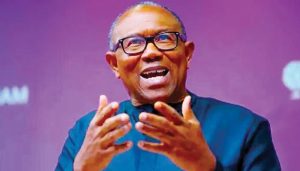By Patience Akpuru-Egwuwa
The Nigerian Ports Authority (NPA) said it would soon establish Port Community System (PCS) with the support of the government and the technical advisory of the International Maritime Organization (IMO).
This was disclosed recently in Lagos by the Managing Director, NPA, Mohammed Bello-Koko, during the annual Association of Maritime Journalists of Nigeria (AMJON) Conference and Award ceremony.
He said the system would bring together all stakeholders in the port community so as to facilitate the ease of doing business at the ports.
PCS is an electronic platform which connects the multiple systems operated by a variety of organisations that make up a seaport, airport or inland port community.
The MD, who was represented by the General Manager, Corporate and Strategic Communications, Mrs. Yemisi Oyinlola, in a paper presentation titled ‘Nigeria and the Evolving New Port Order,’ said: “Our role as port players is to position the port on the part of competitiveness with focus on quality port services and right pricing. This is what underpins trade facilitation ideals which would ultimately expand the frontiers of trade and foster economic growth.
“It is pertinent to note that with the backing of the government through the Federal Ministry of Transportation and the technical advisory of the International Maritime Organization (IMO), the Nigerian Ports Authority has kick-started the process of establishing Port Community System (PCS).
“The system will bring together all stakeholders in the port community and facilitate ease of doing business in the ports.”
Koko-Bello reiterated that for Nigeria to maximize the benefits of blue economy, both downstream and upstream operations must be fully explored. He pointed out that shipping business must be taken beyond mere vessel and cargo handling at the port to include other services such as bunkering, insurance and hinterland connectivity among others.
According to him, “Maritime activities are made up of downstream and upstream operations. Downstream operation is principally made up of port operation and bunkering, while the upstream consists of insurance, connectivity logistics and shipping activities.
“Ironically, Nigeria operates only in the port operation aspect of downstream operation. Even the port operation is not performing optimally due to a number of inherent challenges.
“Today, Nigeria has not fully utilized the opportunity offered by the upstream maritime economy. This explains why maritime sector has not contributed substantially to the Nigerian economy.
“To reposition the Nigerian economy, particularly the maritime sector, the managers of our economy need to pay requisite attention,” he stressed.
On the initiatives by the NPA to facilitate trade through the sea, the MD affirmed that the management has taken up the gauntlet and embarked on certain initiatives towards repositioning the Nigerian ports on the path of competitiveness, and rehabilitation of port access roads to improve hinterland connectivity.
He added that the electronic truck-traffic call-up system in Lagos pilotage district towards addressing truck congestion along the port access road has been effective, saying that management had licensed 37 Satellite Truck Parks (with the capacity to accommodate 7,000 trucks) to service the incoming trucks to the ports in Lagos under the Electronic Truck Call-Up System (ETO) which became operational in July, 2021.
The Managing Director also averred that registration and licensing of 28 empty containers holding bays with a total capacity of 137,000 TEUs has come on stream to tackle the traffic situation along ports corridors
News direct from the source










More Stories
Obi prays for God to grant Soludo greater heights Chuks Eze The presidential candidate of the Labour Party (LP) in the 2023 general elections, Mr Peter Obi, has called on the Anambra State Governor, Chukwuma Soludo to show humility, gratitude and compassion, following what he described as an ‘unfortunate and bitter’ outburst by the governor. Speaking to journalists at the just-concluded Nigeria Guild of Editors meeting at the NAF Conference Center, Abuja, Obi congratulated Soludo for securing a second tenure and urged him to appreciate God’s mercies by responding to victory with grace rather than resentment. Obi’s remarks came after Soludo provoked controversy during his certificate-of-return ceremony, where he mocked his critics by calling Obi a ‘frustrated politician without a club’ and accused him of damaging the education system in Anambra. “I feel compelled to respond because if I do not, I will be accused of dodging the question,” Obi said, expressing surprise at Soludo’s remarks. “On an occasion meant to celebrate his certificate of return, instead of thanking Almighty God for granting him a second tenure; a moment to demonstrate love and magnanimity, he chose to show bitterness and resentment. It was deeply unfortunate.” Obi clarified his involvement in the recent Anambra election, saying, “I only attended three public events with the Labour Party candidate, strictly where I was invited. At none of these events did I mention anyone by name or meet with traditional rulers, market leaders or any other group to discuss candidates. There was nothing I said to warrant controversy or speculation,” he stressed. Reflecting on the Election Day, Obi recounted how he quietly fulfilled his civic duty, conscious of the weight of responsibility that comes with leadership. “I witnessed irregularities and disruptions that could have easily escalated into chaos,” he said. “When outsiders attempted to cast votes in our community, I stepped in and urged my people to remain calm and allow them to act peacefully. In that moment, I was reminded that integrity must always take precedence over politics. True leadership is measured, not by the contest for power, but by the courage to uphold fairness, restraint and the dignity of our people, even in the most trying circumstances.” Addressing Soludo’s mocking remarks, he used a vivid metaphor from football to clarify his perspective: “On the day of the election, journalists approached me as if I were on the ballot. I reminded them that I served as governor 13 years ago and have since moved on to a higher level in national politics. In football terms, if gubernatorial candidates are in the first division, I am in the Champions League. I ran for Vice President in 2019 and for President in 2023, winning 11 states and Abuja. I play well at that level, and my record speaks for itself.” He also reflected on his age and historic achievements in Anambra State. “In both the old and new Anambra, only Jim Nwobodo and I became governors in our 40s. I was the first to serve a second tenure. I have no personal issue with Governor Soludo. I pray that God grants him even greater heights, if that will inspire him to show humility, compassion and a genuine concern for the people,” he said. He concluded with an appeal, saying, “We must recognise the mercies God grants us. Leadership is not about resentment or bitterness; it is about service, gratitude, and love for our people.”
Kano: Yusuf assents to Law establishing Gaya Polytechnic
Why we brew Doncoco locally – Onwunali, Iki Leads boss